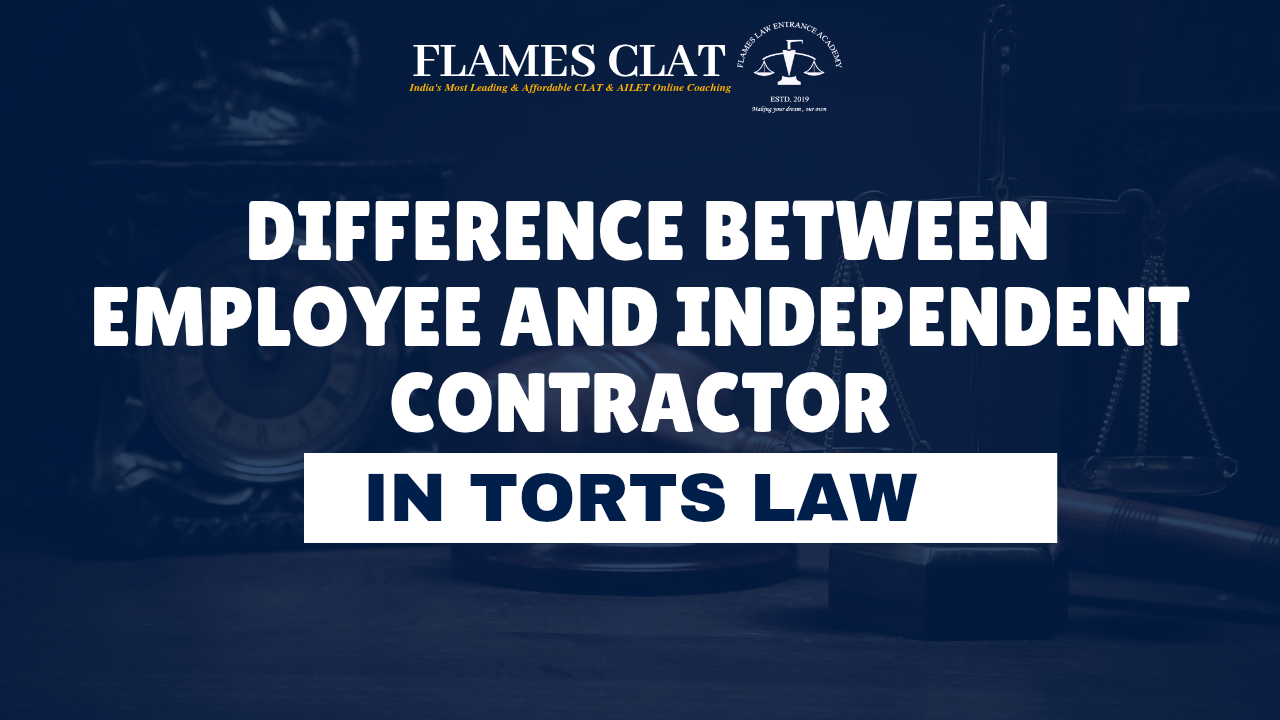Difference Between Employee and Independent Contractor in Tort Law
In Law of Torts, we come across the concept of Vicarious liability, according to which a person is legally liable for acts committed by others. The employer is liable for all the tortious acts committed by the employee during the course of employment. However, employers are not liable for the acts of independent contractors. At Flames CLAT Academy, where future legal professionals are trained to think critically and interpret evolving laws, such provisions are frequently debated in classes and workshops to nurture socially aware legal minds. This blog aims to explore the distinction between an employee and an independent contractor in vicarious liability.
What is Vicarious Liability?
The Vicarious Liability is based on the maxim “respondeat superior,” meaning “let the principal be liable”. Hence, making the master or employer liable for all actions by his servant or employee during the employment. This does not translate to no liability for the servant or employee, but liability to a certain extent for the tort committed. The maxim “qui facit per alium facit per se,” meaning “he who does an act through another, does the act through himself,” explains the reasoning behind the liability of the master.
This liability is applicable to the following relations:
- Principal–Agent
- Master-Servant
- Employer-Employee
- Partners of a Corporation
Constituents of Vicarious Liability:
- The employee should commit a Tort
- There has to be a work relationship between the employee and the employer
- Wrong should be committed during the course of employment
Who is an Employee?
An employee is a person hired to accomplish certain tasks in exchange for monetary benefits, typically wages or salary. The scope of the employment changes from the requirements of the job and the number of employees required to complete the task.
E.g., people working in a company or officials in a government office, etc.
Who is an Independent Contractor?
An independent contractor is a person or organisation that is employed for a specific project or job. It is not the scope of employment that changes the job requirements; rather, there is a fixed task allotted to these people.
E.g., A photographer shooting a specific movie, real estate agents, etc.
Difference between Employee and Individual Contractor
An employee receives a fixed wage or remuneration daily or monthly, whereas an independent contractor is paid upon the completion of the project as per the price negotiated.
An employee typically works for one company or organisation only, whereas an independent contractor can work for multiple clients at a time.
An employee has a fixed term or duration of work with a continuing relationship, but an independent contractor has a temporary relationship with the business until the completion of the project.
The employer exerts greater control over employees' actions as compared to an independent contractor. For instance, employees will be directed to how, when, and where the work will take place, whereas an independent contractor operates independently, by deciding how, when, and where their task will be accomplished.
The tools and equipment for work are provided by the employer to its employees; however, an independent contractor has autonomy to select the material required to complete the job.
Liability of the employer in the case of an Individual Contractor
An employee and an independent contractor are quite similar as they work for the employer. They receive the work from their employer, which means they do not have the choice to decide the work. An employer, however, is held liable for the acts of his employees, but not for the acts of an independent contractor, because an employee is engaged in a contract of employment, but an independent contractor is engaged in a contract of service.
The employee’s actions are controlled by the employer. For example, in a company, the employer supervises and directs their employees to work according to their instructions. But the actions of an independent contractor are not controlled by the employer, as they choose how work is to be completed.
Conclusion
Thus, an employer is liable for all the actions of an employee during employment but not for those of an independent contractor. This is an important exception to the rule of vicarious liability under the law of tort. Legal educators at Flames CLAT Academy continue to emphasize such discussions as essential for aspirants preparing for CLAT and judiciary exams, where understanding legal concepts and their exceptions are not just academic goals but tools for real-world impact.
Join our Flames CLAT Family at https://t.me/flamesclat
For Informative videos, do check out https://youtube.com/@flamesclat?si=-PqiaRLEjutM-iYj




Write a Review
Your email address will not be published. Required fields are marked *